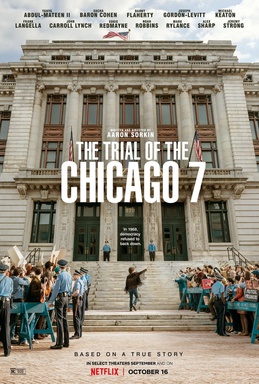It needs to be noted that Sorkin's approach to telling the story of the seven activists from four separate organizations (portrayed in the film by Sacha Baron Cohen, Eddie Redmayne, Jeremy Strong, Alex Sharp, John Carroll Lynch, Noah Robbins and Daniel Flaherty) and Black Panther leader Bobby Seale (Yahya Abdul-Mateen II) who were accused of conspiracy to cross state lines to incite a riot during an Anti-Vietnam protest outside of the 1968 Democratic Convention will almost certainly irk people looking for an on-the-nose retelling. The theatrical-esque staging to the courtroom scenes paired with several characters tendency to rattle off witty zingers like they're in an improv troupe makes it clear that this is a dramazation, not a documentary. Personally, I felt that Sorkin's heightened approach to telling the story of the trial and the events that put these men in the crosshairs of the federal government really helped hammer home its significance.
The problem with retelling history is that sometimes it can get really dry. Should learning about important events from the past always have to come in the form of an engaging exercise? Of course not, but the reality is that teaching through an entertainment-based lens makes people more likely to care and subsequently gain something from what they're being told. Sorkin has understood this even when telling a story about something as naturally fluffy as Billy Beane's rise to prominence in the baseball executive world in Moneyball and The Trial of the Chicago 7 may just be the greatest victory for the effectiveness of this philosophy to date.
Adding humor and showy monologues into a story that's centered around the extraordinary lengths the people in power-even in a "democratic" nation like the United States- will go to attempt to silence their critics helps showcase the humanity that sat behind these people that have effectively turned into forgotten footnotes in time. These were eight men that Nixon administration felt compelled to make an example of for a variety of political reasons and by utilizing a brilliant present day interwoven with flashback sequences narrative approach that showcases the various ways each member of the group approached activism and dealt with the prospect of going to prison over their willingness to speak out against something they believed was wrong captured the emotional roller coaster they experienced while going through this prolonged public ordeal with potentially life-altering ramifications. Bringing the Chicago 7's story to life in a more traditional, stoic biopic fashion would've likely still made for a fine movie, but in Sorkin's hands-it turns into an electrifying powerhouse that entertains and enlightens in equal measure.
The Trial of the Chicago 7 is not only the best film of 2020 to date, it ranks among the most impressive pieces of work Sorkin has authored over the course of his vaunted career. There was a lot of room for error with this story, but thanks to his desire to highlight the people underneath the infamous group moniker and the cause they were fighting for as much as the injustice they faced while sticking to his witty, high energy playbook, he was able to make a piece of art that is impactful, entertaining and unforgettable. In what figures to be a thinner than usual class of awards contenders this year, there's a real chance that Sorkin will be able to another trophy or two to his already sizable collection.
Grade: A

No comments:
Post a Comment